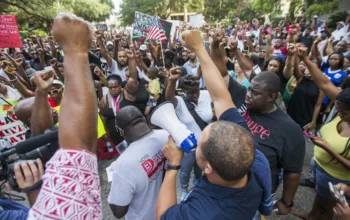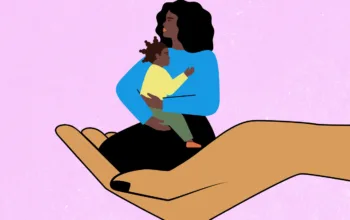Critiques by journalist Emily Yoffe and others blame women for speaking out.
It’s been nearly two years since the current, most public phase of the #MeToo movement began.
The months of near-daily allegations against high-profile men are over, and in their place are bigger questions about how, as a society, we can reckon with those allegations.
Those questions have no easy answers. So perhaps it’s no surprise that one response at this particular point in #MeToo has been to argue that while the movement is valid, it has gone too far.
This was the subtext of Jane Mayer’s recent New Yorker investigation into the allegations against former Sen. Al Franken. And in a recent story in the libertarian magazine Reason, Emily Yoffe makes the critique more explicitly, arguing that allegations against former Los Angeles Times reporter Jonathan Kaiman reveal deep flaws in the movement.
Kaiman was accused of sexual misconduct by multiple women, including reporter Felicia Sonmez, who says that he digitally penetrated her without her consent. The allegations, which Kaiman disputes, led to an investigation by the Times and Kaiman’s eventual resignation.
Yoffe casts Kaiman as a victim of “mob justice,” and blames Sonmez and another woman, Laura Tucker, for ruining his promising career by speaking out. “We are now in a time when the uncertain circumstances surrounding one regretted sexual encounter and another hazily remembered (and fiercely disputed) intimate encounter are sufficient to destroy the accused’s life,” she writes.
Meanwhile, Sonmez says that Yoffe misrepresented many aspects of her account — and that what happened to Kaiman resulted from his actions, not her decision to talk about them.
The #MeToo movement has raised real questions about how to adjudicate allegations of sexual misconduct in a way that’s fair to all parties, when the legal system and many company human resources departments are so demonstrably unequal to the task. #MeToo’s critics have brought up some of these questions. But in the process, they often shame the women who have spoken out, casting them as part of a vindictive mob out to ruin men’s lives.
Two years into the current phase of #MeToo, the time is ripe for a conversation about what justice in sexual misconduct cases should look like. But that conversation can only be productive if it includes the voices of the people who have risked their careers, their mental health, and sometimes their safety by coming forward. We all lose if those voices are shamed back into silence.
Recent critics of #MeToo say the movement is valid — but goes too far
Critiques of the #MeToo movement began popping up soon after it gained steam. In January 2018, for example, Daphne Merkin argued in the New York Times that women, including some feminists, were criticizing #MeToo privately even as they praised it publicly — “some women, including random people I talk to in supermarket lines, have gone so far as to call it an outright witch hunt,” she wrote. The same month, the sexual misconduct allegations against Aziz Ansari led to a round of backlash: At the Atlantic, Caitlin Flanagan wrote that young women were “angry and temporarily powerful, and last night they destroyed a man who didn’t deserve it.”
#MeToo backlash has continued in tandem with the movement, with some accused men joining in — John Hockenberry, for example, a former WNYC radio host who was accused of sexual harassment or unwanted messages by multiple women, wrote at Harper’s last October about the injustices he saw in his situation and the need for “a return to romance” in American life.
Some more recent critiques, however, have taken a different tone. In her New Yorker story, Mayer does not take the entire #MeToo movement to task. Rather, she casts the handling of the allegations against Franken as a threat to the movement. Mayer quotes Debra Katz, a lawyer who represented Christine Blasey Ford: “The allegations levelled against Senator Franken did not warrant his forced expulsion from the Senate, particularly given the context in which most of the behavior occurred, which was in his capacity as a comedian.”
“To treat all allegations the same is not only inappropriate,” Katz tells Mayer. “It feeds into a backlash narrative that men are vulnerable to even frivolous allegations by women.”
Yoffe is similarly concerned with threats to the movement. “#MeToo is a necessary and important corrective to some horrifying, copiously documented, and criminal-level behavior, and also to the kind of persistent harassment that still characterizes too many workplaces,” she writes.
But some allegations do not merit bringing up in the context of #MeToo, she argues: “We are now in a time when a sexual encounter can be recast in a malevolent light, no matter whether the participants all appeared to consider it consensual at the time.”
And for Yoffe, bringing up such encounters now can tarnish the movement: “creating injustice today does not undo the harms of the past; instead it undermines the integrity of the necessary effort to address sexual misconduct.”
Yoffe hangs her argument primarily on the case of Kaiman, at one time the Beijing bureau chief for the Los Angeles Times.
In a January 2018 Medium post, Tucker wrote that Kaiman had pressured her into sex, refusing to leave her apartment and coercing her to continue after she told him clearly that she wanted to stop. According to Yoffe, Kaiman remembers the night differently and believes no coercion occurred.
Sonmez, meanwhile, says that Kaiman digitally penetrated her without her consent after a night of drinking, refusing to stop until she pushed him away, and that he later had unprotected sex with her when she was very drunk.
“I am devastated by the fact that I was not more sober, so that I could say with absolute certainty whether what happened that night was rape,” Sonmez wrote in a letter to the Foreign Correspondents’ Club of China, a professional association of which Kaiman was a part.
According to Yoffe, Kaiman says the sex was protected and Sonmez only objected to being digitally penetrated because they were in public at the time. “Kaiman says he has never forced himself on anyone and is sickened at the idea of it,” Yoffe writes.
But after an investigation by the Los Angeles Times, Yoffe reports, Kaiman was told in August 2018 to resign or be fired; he resigned.
Now, Yoffe writes, Kaiman is “jobless and homeless” and has considered suicide. “On the basis of equivocal and heavily disputed accusations,” she writes, “Kaiman’s life is in tatters.”
Criticisms of #MeToo often include criticism of women for “going public”
In her investigation of the allegations against Franken, Mayer devotes a great deal of space to the question of whether actress Leeann Tweeden was right to be upset that Franken had mimed grabbing her breasts for a photo. She includes a detailed description of Tweeden’s previous performances with Franken, which included a kiss with an audience member: “In video footage, she seems to be gamely playing the part, setting off hoots and hollers from the crowd,” Mayer writes.
No one disputes that the photo is genuine, and Franken has apologized for it. But Mayer strongly implies that Tweeden was wrong to complain about it, at least in the way she did.
Yoffe has a similar criticism for the women who reported misconduct by Kaiman.
Of Tucker, Yoffe asks, “Why would she go public — giving Kaiman no warning — with this story of a long-ago, private event that, while regretted, did not involve a sexual assault? Especially since in telling it she was sure to damage someone who had been a friend and who held no power over her?”
Yoffe also writes that while Tucker’s testimony might not have been enough to harm Kaiman, “the Sonmez accusation changed everything.”
“Even though it is disputed by Kaiman, that charge established in the minds of many that what happened between Kaiman and Tucker was not just a single regretted event but part of a pattern,” Yoffe writes. “And pattern is an explosive concept in the world of #MeToo.”
Sonmez has responded to Yoffe’s story with a detailed thread of corrections that casts much of Yoffe’s story into doubt. For instance, Sonmez writes that another allegation against Kaiman had been shared privately before Tucker went public with hers. She also writes that Kaiman has acknowledged digitally penetrating her without her consent.
And she takes issue with the idea that her allegation established a “pattern” in the minds of investigators. “My accusation and Ms. Tucker’s are not what established that Mr. Kaiman has a pattern of misconduct,” she writes. “Mr. Kaiman’s own alleged actions are what established that.”
Shaming women does nothing to help the movement
If Yoffe’s intent was to draw attention to the imperfections in the way American society handles allegations of sexual misconduct, she chose a worthy cause. The legal system is notoriously ill-equipped to handle such allegations. The legal definition of sexual harassment is so restrictive that it does not capture much behavior that can damage people’s lives and careers. Meanwhile, allegations of sexual assault rarely lead to convictions, and people who come forward can be retraumatized by authorities who shame or blame them for their own violation.
It’s telling that Yoffe mentions the convictions of Bill Cosby and Larry Nassar — it often takes the allegations of dozens of women to make a criminal conviction stick (Cosby, notably, had to be tried twice).
Internal investigations by companies are little better. For every story like Kaiman’s, there are several like that of astrophysicist and TV host Neil deGrasse Tyson, who was investigated by his employers at Fox, the National Geographic Channel, and the American Museum of Natural History after several women accused him of sexual misconduct. In the end, he kept all of his jobs after a process that, according to the women, lacked transparency.
#MeToo has raised real questions about how, given the failings of both the legal system and company human resources departments, we should actually adjudicate claims of sexual misconduct. Yoffe’s story points to some of these questions. For example, she writes that Kaiman is “one of the least famous, least powerful men on the lists published by The New York Times and Bloomberg of those who have lost their jobs in the wake of #MeToo.”
Many of the most high-profile men accused of sexual misconduct as part of #MeToo are planning or have already executed their comebacks. Louis C.K. is performing again; Mark Halperin has a book deal. Others don’t need to make a comeback because they never faced consequences — President Trump, for example, has been accused of sexual misconduct by more than 20 women, and remains in charge of the country.
Yoffe also notes that the loss of a job and public opprobrium can lead to real psychological pain for the accused party. This is not a reason to keep someone in a job when that person might be a threat to others, but it is a reason to consider what kinds of mental health support people who lose their jobs as a result of #MeToo (or, for that matter, for any other reason) might need, and how to ensure that they get it. Suicidal depression is in no way an appropriate punishment for sexual misconduct.
The framework of restorative justice has been used on college campuses in sexual misconduct cases, and holds some promise in thinking about #MeToo on a larger scale as well. In restorative justice, the focus is on repairing the harm done, not necessarily on meting out punishment. The alleged perpetrator is often part of the process, and can receive the support necessary to address the root causes of the harm as well as to prevent reoffending.
But too often, those who say that #MeToo goes too far have called not for such holistic approaches, but for women to stay silent. Yoffe criticizes the investigative process at the Los Angeles Times, but her main thesis seems to be that if only Tucker and Sonmez had thought more before they talked about what happened to them, Kaiman would still have his job and his happiness.
People who speak up about sexual misconduct — especially if they’re women — have long been blamed, shamed, and disbelieved. They’ve long been told that their words are unseemly and that they should be quiet before they ruin men’s lives. #MeToo has served as a much-needed counterweight to these messages, a movement that tells survivors that, finally, their words matter.
As the movement matures, it’s appropriate to think through how we should respond, as a society, to those words. It’s not appropriate — it is, indeed, moving backward — to tell people not to speak them.
Author: Anna North
Read More



